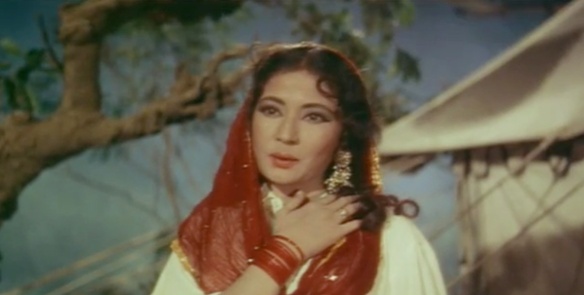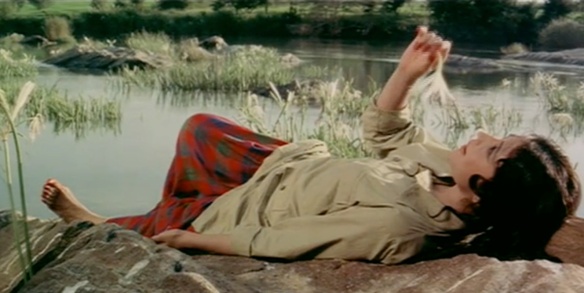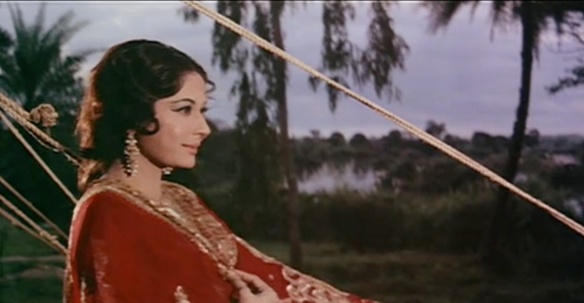
Guru Dutt evokes classic Christ-like imagery in his depiction of Vijay the struggling poet in Pyaasa (1957).
We now present the lyrics and full English translation to one of my all-time favorite Guru Dutt songs “Jaane Woh Kaise” from Pyaasa (1957). I think my undying love for Guru Dutt is pretty evident at this point, but in case you need some convincing to get over the bold Clark Gable ‘stache, start here. Pyaasa is no ordinary film. When released to roaring accolades in 1957, Pyaasa broke precedent upon precedent in both impact and style. Notice how every song in this film seems to flow naturally as a consequence of the plot, as if the lyrics of the songs were a poetic continuation of the spoken dialogue? It was a technique pioneered by Guru Dutt that was later emulated by every great director in Bollywood. And the film hit some hard topics. I discuss more of the political stance of the film and the fascinating struggle Guru Dutt faced behind-the-scenes earlier, but now let us look instead to the classic “Jaane Woh Kaise” hit from the immortal pen of Sahir Ludhviani. It’s a mixture of everything right in the world: Guru Dutt as actor, Hemant Kumar with vocals, S.D. Burman composing, and Sahir in the back with the words of wisdom. This Hemant Kumar gem is truly the industry standard for awkward dinner party songs–even copied in modern times by Mira Nair in her film Vanity Fair (2004)!
Guru Dutt is employed as a dinner party waiter for his rich boss, Rehman, where he is confronted by the reality of his former lover, Mala Sinha, having abandoned him for wealth by marrying none other than the man currently employing him. The injustice of it all gets to him, and by chance, he’s a poet at heart who does what any other tragic poet would do in the situation: drop everything and throw a pity party.
I love the cinematography in this song–Guru Dutt and his brilliant Director of Photography V.K. Murthy were known for their overblown yet graceful dolly-ins (watch the camera fly in “Waqt Ne Kiya“!), and so too in this song, the camera acts as a silent messenger of emotional turmoil, extracting a beautifully devastating toll on each of the key players in the room. And Guru Dutt holds his ground with arms outstretched as if crucified–a soft-spoken martyr against a background of bookshelves in which his own spoken words will later be immortalized and massacred. Again, you really need to see the film to appreciate the poetic genius of Guru Dutt film-making.
So enough talk, onto the lyrics and English translation of “Jaane Woh Kaise” from Pyaasa (1957)! Check out the picturization on youtube and let us know what you think in the comments!
Jaane Woh Kaise Log Lyrics and Translation
Jaane woh kaise log the jinke pyaar ko pyaar mila
I wonder what kind of people find their love reciprocated
Humne to jab kaliyaa.N maangii kaa.NTo.N kaa haar milaa
Whenever I asked for flowers, I received a garland of thorns
Khushiyo.N kii manzil DhoonDii to gham kii gard milii
I searched for a destination of joy, but I found a circle of sadness
Chaahat ke naghme chaahe to aahe.N sard milii
I desired tales of love, but I received only the coldness of sighs
Dil kii bojh ko duunaa kar gayaa, jo ghamkhwaar milaa
The burdens of my heart only doubled if I met someone meant to relieve my sorrow
BichhaD gayaa har saathii dekar pal do pal kaa saath
Every companion gave me a few moments of company, and left
Kisko fursat hai jo thaame diiwaano.N kaa haath
After all, who has the free time to hold a crazy man’s hand?
Humko apnaa saayaa tak aksar bezaar milaa
Even my own shadow is often weary of me
Isko hii jiina kehte hai.N to yuu.N hii jii le.Nge
If this is what they called life, then I will live like this
Uff na kare.Nge, lab sii lenge, aa.Nsuu pii lenge
I will not sigh, I will seal my lips, and swallow my tears
Gham se ab ghabraana kaisaa, gham sau baar milaa
After all, how can I be concerned by sadness? I have met sadness a hundred times
Humne to jab kaliyaa.N maangii.N kaaTo.N kaa haar milaa
When I asked for flowers, I found a garland of thorns
Jaane woh kaise log the jinke pyaar ko pyaar mila
I wonder what kind of people find their love reciprocated
Glossary:
kali: flower; kaanTaa: thorn; haar: garland; manzil: destination; gham: sadness; gard: circle; chaahat: love, desire; naghma: tale; aah: sigh; sard: chilly, cold; bhoj: burden; duunaa karna: to double; ghamkhwaar: a remover of sadness (note: the w is silent, as in khwaab); bichhaD jaanaa: to become separated; saathi: companion; fursat: free time; haath thaamnaa: to hold hands; saayaa: shadow; bezaar: fed up, weary; lab: lips; aa.Nsuu: tears; gham: sadness: ghabraanaa: to become anxious, concerned

Singing his heart out, Guru Dutt transforms Rehman’s classy dinner gathering into a awkwardly personal pity party in Pyaasa (1957).
Guru Dutt revives the martyr-style mis-en-scene in the reprise of “Yeh Duniya Agar Mil Bhi Jaaye” at the famous finale of the film! The scene has got to be one of the all-time greatest of Hindi cinematic history. For this and about a million other reasons, Pyaasa is absolutely mandatory classic Bollywood viewing!
-Mrs. 55











